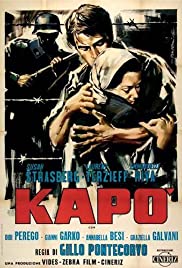
KAPO
France/Italy, 1959, 117 minutes, Black and White.
Susan Strasberg, Laurent Terzieff, Emmanuele Riva.
Directed by Gillo Pontecorvo.
Kapo is an Italian- French co-production directed by Gillo Pontecorvo. He was later to make the political films The Battle of Algiers and Burn, with Marlon Brando. His co-writer, as with his other films, is Franco Solinas, a frequent collaborator with Costa Gavras.
The film is a late '50s re-examination of the concentration camp situation of Jews and non-Jews alike, of Nazi treatment of prisoners, of human suffering and humiliation, of human will bending and adopting the severe and power-hungry values of the Nazis.
This is particularly striking because the focus of action is on Edith, a Jewess from Paris, 14 years old. She is helped in the concentration camp especially by Therese, a Resistance member. However, she is so humiliated that in desperation she becomes a head prisoner, a Kapo, a camp guard. She becomes the object of hatred. Her redemption comes in her attachment to a Russian prisoner and she helps with a mass escape, ultimately giving her life. The film is well-acted by Susan Strasberg in the role of Edith.
The film is quite powerful and says much about human nature in stress situations. It had mixed reactions in its time -some reviewers feeling that it was merely a cliche re-looking at material well enough treated in films. However, in the light of '60s and '70s films about the holocaust and concentration camps, it stands well.
1. The tradition from the '40s of prisoner-of-war films? The portrayal of prisoners in Nazi concentration camps? The prison situation, power and humiliation, suffering and need? This film's contribution to emotional response and insight into the prison experience?
2. The work of Gillo Pontecorvo and his political stances, his interest in war, criticisms of war? His grim perspective?
3. Black and white photography, Paris, concentration camps? Exteriors, interiors? The creation of atmosphere? The attention to detail? Editing and pace? The musical score?
4. The initial focus on Edith? Paris, family, the piano, her age? The telephone and the transition for her life? The stages of being transported to the concentration camp? A transition from a different kind of life to the possibility of death? Her suffering, being helped, her choices, fate? The use of the piano?
5. The impressions of prisoners being arrested, transported, moving into the camps? The film's style in creating atmosphere: piano, truck and leaving, train, the camp, baby, wanderings, the doctor, the dress, identity? The focus on Nazi attitudes towards the Jews? Edith saved - the death of her parents?
6. The reality of the camp, conditions, treatment, human dignity? The range of prisoners, relationships? The cruelty of authority? Separations, chambers?
7. Edith being saved by the camp doctor, the name on the clothes of Nicole? Edith becoming a non-Jewish political prisoner? The transfer to the next camp? The importance of the change of identity? Her continued suffering? The friendship with Therese? Belonging to the Resistance? Therese keeping Edith's will strong? Food, the potato, translation? The importance of Edith being saved after the medical inspection? Her being selected to entertain German soldiers? Her reaction, fear of death? The credibility of her collaboration? The consequences for her: Kapo, her work in the camp, the suspicion of fellow prisoners, growing to hatred? Her increasing severity? The coming of the Russians and her reaction to them? Her almost causing Sasha's death? Her attraction towards him, falling in love? The effect of Therese's suicide? The advance of the Russian army? The plan of escape?
8. The portrait of Therese, her place in the concentration camp, background as a Resistance worker, her care for Edith, translation, food, keeping her alive? The pathos of her suicide?
9. Sasha and the Russians, Edith's severity, his almost dying? The attraction towards each other, their meetings? The possibility of escape? Edith telling him the truth?
10. The escape plan, Edith giving her life for the others?
11. The film as a war story, concentration camp story? Insight? Emotional response? Death and atonement? Insight into power, cruelty, fear and the exploitation of human nature?